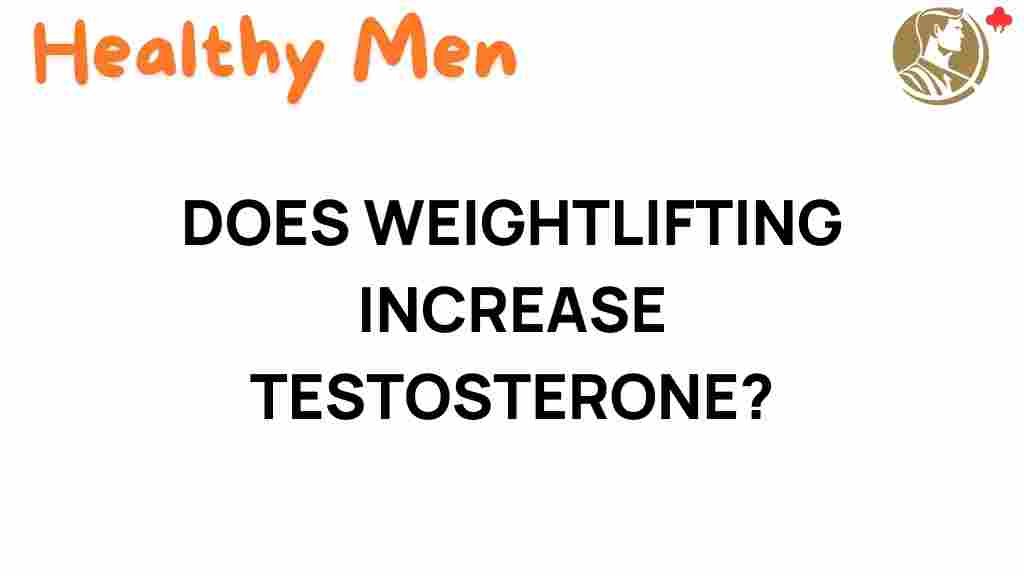Unveiling the Truth: Does Weightlifting Boost Testosterone Levels?
In the world of fitness, weightlifting is often hailed as a cornerstone of strength training. Many enthusiasts and athletes believe that engaging in weightlifting not only enhances muscle growth and athletic performance but also plays a significant role in boosting testosterone levels. But is this belief grounded in science? In this article, we will explore the relationship between weightlifting and testosterone, shedding light on the exercise benefits, hormonal health, and how strength training can impact your overall fitness journey.
The Hormonal Landscape: Understanding Testosterone
Testosterone is a vital hormone that plays a crucial role in various bodily functions, particularly in men. It is responsible for:
- Muscle mass and strength
- Bone density
- Fat distribution
- Sex drive
- Overall energy levels
As men age, testosterone levels naturally decline, often leading to a decrease in muscle mass, increased body fat, and a drop in energy levels. This makes understanding how to maintain or boost testosterone levels essential for overall hormonal health.
How Weightlifting Affects Testosterone Levels
Numerous studies have investigated the impact of strength training on testosterone levels. Here are some key findings:
- Acute Increases: Weightlifting can lead to short-term spikes in testosterone levels. This is particularly evident after intense workouts, especially those involving large muscle groups or heavy weights.
- Long-Term Effects: Regular strength training may help maintain higher testosterone levels over the long term. Some research suggests that consistent weightlifting can counteract the age-related decline in testosterone.
- Type of Training Matters: The intensity and volume of the workout play a significant role. Compound movements (like squats and deadlifts) that engage multiple muscle groups tend to elicit a more substantial hormonal response compared to isolation exercises.
Step-by-Step Guide to Maximizing Testosterone Through Weightlifting
If your goal is to boost testosterone levels through weightlifting, consider the following strategies:
1. Focus on Compound Exercises
Incorporate exercises that work multiple muscle groups, such as:
- Squats
- Deadlifts
- Bench Press
- Rows
- Overhead Press
2. Lift Heavy Weights
Aim for weights that challenge you. Generally, lifting heavier weights (around 70-85% of your one-rep max) for lower repetitions (3-6 reps) can stimulate more testosterone production.
3. Optimize Training Volume
Engage in a balanced approach to volume. Training sessions that include 3 to 5 sets with 6 to 12 repetitions are often effective.
4. Allow for Adequate Rest
Rest is crucial for recovery and hormonal balance. Make sure to include:
- Rest days in your routine
- Sleep at least 7-8 hours per night
5. Maintain a Balanced Diet
Nutrition plays a vital role in hormonal health. Focus on:
- Protein-rich foods to support muscle repair
- Healthy fats for hormonal production (e.g., avocados, nuts, olive oil)
- Whole grains and vegetables for overall health
6. Manage Stress Levels
High stress can lead to elevated cortisol levels, which negatively affect testosterone. Incorporate stress-reducing practices such as:
- Meditation
- Yoga
- Deep breathing exercises
Common Myths About Weightlifting and Testosterone
As with any fitness topic, several myths surround weightlifting and testosterone. Here’s a look at some misconceptions:
- Myth 1: Only men benefit from weightlifting when it comes to testosterone.
*Fact:* Women also produce testosterone, albeit in lower amounts, and can experience benefits from strength training. - Myth 2: Lifting weights will automatically increase testosterone levels significantly.
*Fact:* While there can be an increase, it may not be as dramatic as some expect. - Myth 3: You need to lift heavy all the time.
*Fact:* A balanced approach with variation in weights and repetitions is key to long-term success.
Potential Troubleshooting Tips
If you’re not seeing the testosterone boost you expected from weightlifting, consider these troubleshooting tips:
- Evaluate Your Training Program: Ensure your routine includes adequate intensity and variety.
- Check Your Nutrition: Make sure you’re consuming enough calories and the right balance of macronutrients.
- Monitor Sleep and Recovery: Lack of sleep can significantly impact testosterone production.
- Consult a Healthcare Professional: If you suspect hormonal imbalances, consider getting your testosterone levels checked.
The Overall Benefits of Weightlifting Beyond Testosterone
While boosting testosterone is a significant benefit of weightlifting, it’s not the only one. Here are additional exercise benefits that come with regular strength training:
- Increased Muscle Growth: Consistent weightlifting leads to hypertrophy, which enhances your overall physique and strength.
- Improved Bone Health: Weight-bearing exercises help increase bone density, reducing the risk of osteoporosis.
- Enhanced Athletic Performance: Strength training improves overall athleticism, agility, and endurance.
- Better Mental Health: Exercise, including weightlifting, is linked to reduced symptoms of anxiety and depression.
- Support for Weight Management: Increased muscle mass helps elevate your resting metabolic rate, aiding in fat loss.
Conclusion
In summary, weightlifting does have the potential to boost testosterone levels, especially when performed with the right intensity and frequency. By focusing on compound exercises, lifting heavy weights, optimizing your nutrition, managing stress, and allowing for rest, you can enhance your hormonal health and overall fitness.
Remember that the benefits of weightlifting extend beyond just testosterone. From muscle growth to improved athletic performance, the advantages of strength training are numerous. If you’re looking to delve deeper into fitness and strength training, consider exploring more resources or consulting a professional trainer.
For more insights on fitness and strength training, check out this reliable resource. And if you’re interested in tracking your progress and understanding more about hormonal health, you might want to learn more about testosterone testing.
This article is in the category Fitness and created by healthymen Team
